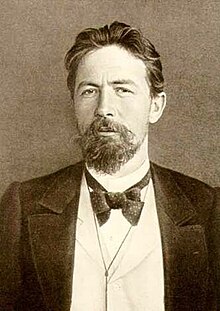Anton Tchekhof
| Anton Chekhov | |
|---|---|
 |
|
| Born | Anton Pavlovich Chekhov 29 January 1860 Taganrog, Russian Empire |
| Died | 15 July 1904 (aged 44) Badenweiler, German Empire |
| Resting place | Novodevichy Cemetery, Moscow |
| Occupation | Physician, short story writer, playwright |
| Nationality | Russian |
| Alma mater | First Moscow State Medical University |
| Notable awards | Pushkin Prize |
| Spouse | Olga Knipper |
|
|
|
| Signature |  |
Anton Pavlovich Chekhov (Russian: Анто́н Па́влович Че́хов, pronounced [ɐnˈton ˈpavɫəvʲɪtɕ ˈtɕɛxəf]; 29 January 1860 – 15 July 1904) was a Russian playwright and short story writer, who is considered to be among the greatest writers of short fiction in history. His career as a playwright produced four classics and his best short stories are held in high esteem by writers and critics. Along with Henrik Ibsen and August Strindberg, Chekhov is often referred to as one of the three seminal figures in the birth of early modernism in the theatre. Chekhov practised as a medical doctor throughout most of his literary career: "Medicine is my lawful wife", he once said, "and literature is my mistress."
Chekhov renounced the theatre after the reception of The Seagull in 1896, but the play was revived to acclaim in 1898 by Konstantin Stanislavski's Moscow Art Theatre, which subsequently also produced Chekhov's Uncle Vanya and premiered his last two plays, Three Sisters and The Cherry Orchard. These four works present a challenge to the acting ensemble as well as to audiences, because in place of conventional action Chekhov offers a "theatre of mood" and a "submerged life in the text".
Chekhov had at first written stories only for financial gain, but as his artistic ambition grew, he made formal innovations which have influenced the evolution of the modern short story. He made no apologies for the difficulties this posed to readers, insisting that the role of an artist was to ask questions, not to answer them.
Anton Chekhov was born on the feast day of St. Anthony the Great (17 January Old Style) 29 January 1860, the third of six surviving children, in Taganrog, a port on the Sea of Azov in southern Russia. His father, Pavel Yegorovich Chekhov, the son of a former serf and his Ukrainian wife, were from the village Vilkhovatka near Kobeliaky (Poltava Region in modern-day Ukraine) and ran a grocery store. A director of the parish choir, devout Orthodox Christian, and physically abusive father, Pavel Chekhov has been seen by some historians as the model for his son's many portraits of hypocrisy. Chekhov's mother, Yevgeniya (Morozova), was an excellent storyteller who entertained the children with tales of her travels with her cloth-merchant father all over Russia. "Our talents we got from our father," Chekhov remembered, "but our soul from our mother." In adulthood, Chekhov criticised his brother Alexander's treatment of his wife and children by reminding him of Pavel's tyranny: "Let me ask you to recall that it was despotism and lying that ruined your mother's youth. Despotism and lying so mutilated our childhood that it's sickening and frightening to think about it. Remember the horror and disgust we felt in those times when Father threw a tantrum at dinner over too much salt in the soup and called Mother a fool."
...
Wikipedia
